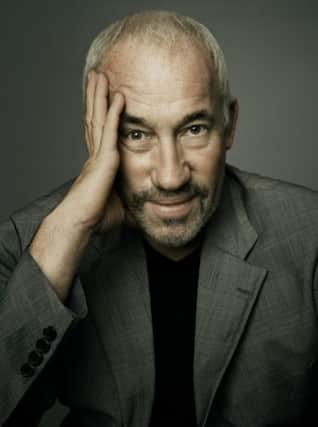Simon Callow takes on Orson Welles


Simon Callow is the kind of man who easily inspires envy.
Award-winning writer, award-winning director, award-winning actor: it feels like there’s nothing he can’t do.
The good news is that he too has feelings of envy when he looks to his own heroes. Unlike most of us, however, Callow is blessed with the ability and opportunity to channel such heroes. Having played Dickens and Oscar Wilde on stage, he is now taking on his greatest challenge – and it appears it’s a challenge upon which Callow has come short. That challenge is Orson Welles.
Advertisement
Hide AdAdvertisement
Hide Ad“In the case of Dickens you can perform his work on stage. Sometimes when I’m performing Dickens, at the risk of sounding new age and all that, I feel like I’m actually channeling him. It’s as though I can feel his blood flowing through my veins,” says Callow.
“Welles proves far more elusive.”
Orson Welles, the polymath who bestrode the world of cinema like none who came before him and few who followed, has been a lifetime obsession for Callow.
One Man Band is the now three-volume biography Callow has written of the great director and actor.
Now Callow is taking a show on the road which, unlike his previous one-man shows, features the actor not performing as a version of his subject, but more simply reading from his book and telling stories about Welles.
Advertisement
Hide AdAdvertisement
Hide Ad“It’s as much about my relationship with Welles as it is about the man himself, that’s what I’m trying to convey with this show,” says Callow.
“It’s almost about my own frustration, my exasperation at trying to uncover the man. I feel at times that I am stalking some great prey. I feel like Ahab pursuing Moby Dick, only I don’t want to capture him and destroy him, I want to observe and understand him. When I was writing about Dickens, I felt he was on my side, like he wanted to help. With Welles it feels like he is constantly trying to trip me up.
“I’m not someone who believes in all that supernatural stuff, but when I was writing my latest volume of his biography, I had computers break and at one point when I was writing, in the throes of finishing it off, my house had a biblical infestation of moths.”
Belief in the supernatural or not, it’s easy to imagine that when you are investigating the life of a human being as extraordinary as Orson Welles, it would be easy to start wondering if there is a higher power. What Welles achieved in life should be impossible for a single person in a single lifetime. It’s easy to see that the draw to tell his story is compelling.
Advertisement
Hide AdAdvertisement
Hide Ad“He achieved a staggeringly large amount of interesting things in so many fields and while there are biographies of him, I wasn’t aware of a book that attempted to look at him in the round,” says Callow, explaining why his fascination developed to the point of a three-volume biography.
“I wanted to understand more about this man who was so prolific and productive and achieved so many things in so many different areas of what we call ‘the arts’. He wasn’t just a filmmaker, he was a theatre director, a painter of some distinction, he created a ballet, he was an inventor. He did at one point very shyly compare himself to Leonardo da Vinci.
“I think it’s a fair comparison. I think he was engaged in the same way that Leonardo was engaged, in that there seemed to be no limit to his great enquiry into the arts and no limit to his ambition.”
It’s exhausting just listening to Callow describe his hero and it’s impossible not to get similarly caught up in his admiration for the great man.
Advertisement
Hide AdAdvertisement
Hide AdIt’s also easy to wonder if Callow is seeking for others to draw comparisons between himself and these great creators. He has, after all, played so many of them on stage in one-man shows, is the point that we might too see him as one of them?
“I find everything I do really quite hard and it’s always much harder when it comes to doing something than I imagined it would be at the time I agreed to do it,” he says.
“What I will say for myself is that I always hang on in there to bring a project to fruition. Alas I am not as talented as these men, but I do hang in there and see things out.”
Callow grew up in a deeply academic household with parents who taught him the value of speaking ‘correctly’: a lesson that has paid off in space, his rich, plummy tones a vital part of his career and character. After drama school he acted in several stage plays before landing a part in the Oscar-winning film adaptation of Amadeus. He came to wider public prominence when he played the flamboyant Gareth in Four Weddings and a Funeral, the character whose death inspires John Hannah’s character to recite Funeral Blues and in doing so created one of the movie’s iconic moments.
Advertisement
Hide AdAdvertisement
Hide AdFrom that moment Callow’s career appeared to go into overdrive, his writing and directing receiving ever-increasing plaudits. He shows no signs of slowing down.
“It’s worse than ever, I fear I must be addicted,” he says.
“It’s partly to do with getting older and becoming more aware of the things one wants to do and the things one feels like one has to do.
“The people I have spent years writing about are greedy. They are greedy for interesting things, greedy to achieve and greedy to put things out in the world.
“I can definitely understand that feeling.”
An Evening with Simon Callow: One-Man Band, Cast at Doncaster, April 1, Leeds City Varieties, April 5.